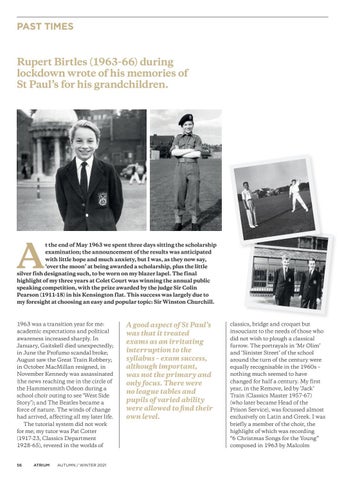PAST TIMES
Rupert Birtles (1963-66) during lockdown wrote of his memories of St Paul’s for his grandchildren.
A
t the end of May 1963 we spent three days sitting the scholarship examination; the announcement of the results was anticipated with little hope and much anxiety, but I was, as they now say, ‘over the moon’ at being awarded a scholarship, plus the little silver fish designating such, to be worn on my blazer lapel. The final highlight of my three years at Colet Court was winning the annual public speaking competition, with the prize awarded by the judge Sir Colin Pearson (1911-18) in his Kensington flat. This success was largely due to my foresight at choosing an easy and popular topic: Sir Winston Churchill.
1963 was a transition year for me: academic expectations and political awareness increased sharply. In January, Gaitskell died unexpectedly; in June the Profumo scandal broke; August saw the Great Train Robbery; in October MacMillan resigned, in November Kennedy was assassinated (the news reaching me in the circle of the Hammersmith Odeon during a school choir outing to see ‘West Side Story’); and The Beatles became a force of nature. The winds of change had arrived, affecting all my later life. The tutorial system did not work for me; my tutor was Pat Cotter (1917-23, Classics Department 1928-65), revered in the worlds of
56
ATRIUM
AUTUMN / WINTER 2021
A good aspect of St Paul’s was that it treated exams as an irritating interruption to the syllabus – exam success, although important, was not the primary and only focus. There were no league tables and pupils of varied ability were allowed to find their own level.
classics, bridge and croquet but insouciant to the needs of those who did not wish to plough a classical furrow. The portrayals in ‘Mr Olim’ and ‘Sinister Street’ of the school around the turn of the century were equally recognisable in the 1960s – nothing much seemed to have changed for half a century. My first year, in the Remove, led by ‘Jack’ Train (Classics Master 1957-67) (who later became Head of the Prison Service), was focussed almost exclusively on Latin and Greek. I was briefly a member of the choir, the highlight of which was recording “6 Christmas Songs for the Young” composed in 1963 by Malcolm















